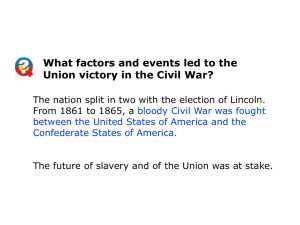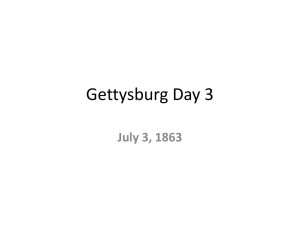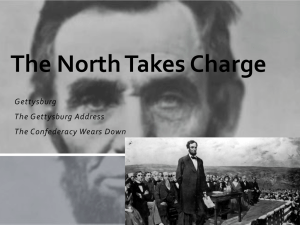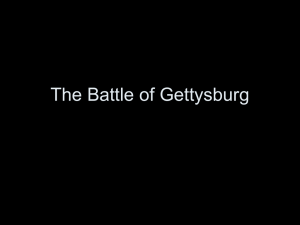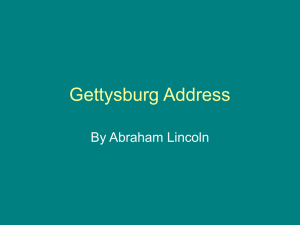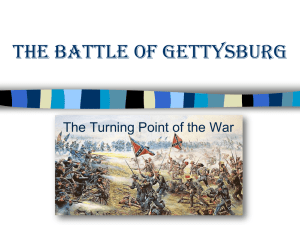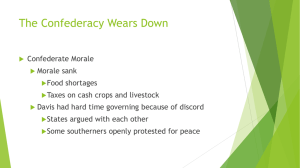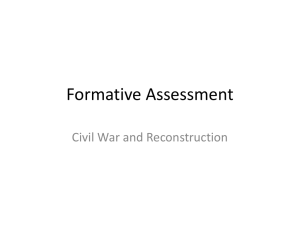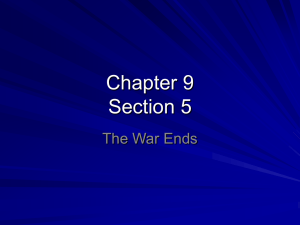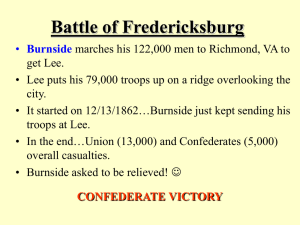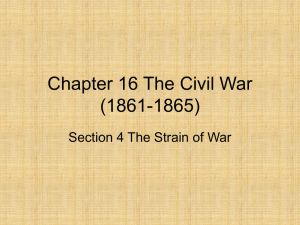The North Takes Charge-Fab
advertisement
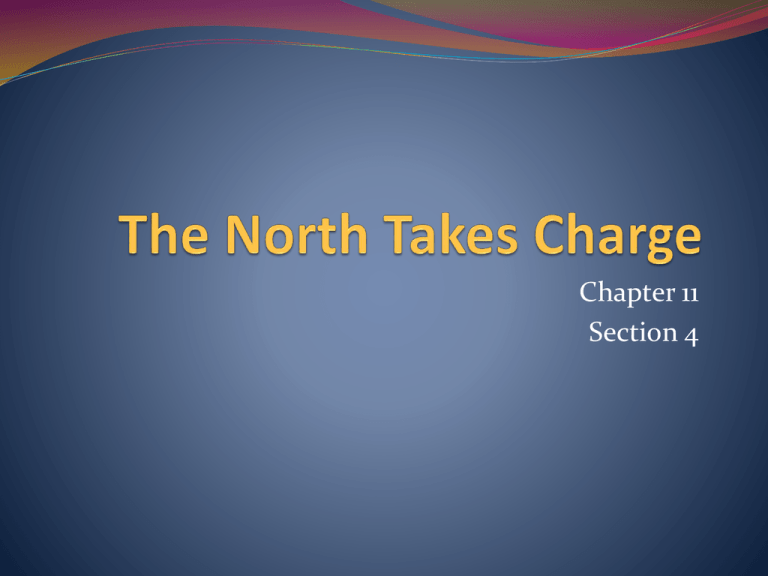
Chapter 11 Section 4 Armies Clash at Gettysburg Prelude to Gettysburg: 1863- Confederacy gains confidence after defeating the North at Chancellorsville. Confederate Gen. Lee outmaneuvered Union Gen. Joseph Hooker Lee now believes that he can invade the Union and force Abraham Lincoln to withdraw troops farther north. Lee pushed all the way into Pennsylvania… Armies Clash at Gettysburg Gettysburg (Day 1) Confederate and Union armies clash north and west of the town of Gettysburg. Confederate troops able to push Union soldiers out of the town However Union troops occupied the high ground to the South of Gettysburg (Cemetery Ridge) Lee knew that the battle wasn’t won until the Confederates forced the Union off the ridge. Armies Clash at Gettysburg Day 2 Lee orders Confederate troops to attack Cemetery Hill Union troops had left Little Round Top undefended Union Col. Chamberlain took his Maine troops and rushed to defend it After repeated attacks, low on ammo and men Chamberlain ordered a bayonet charge Confederate troops tired on marching up hill in extreme hear surrendered in groves. Chamberlain saved the Union lines from being bombarded with Confederate artillery. Armies Clash at Gettysburg Day 3 Confederate and Union armies exchanged artillery fire for hours When Union artillery silenced Gen. Lee sent his men straight into the middle of Union forces As the Confederate forces neared the Union artillery continued The aggressive attack of the Confederacy back-fired Lee was forced to march his men back to Virginia Lee would never attempt to invade the Union again Gettysburg Address November 1863 Ceremony held to dedicate a cemetery in Gettysburg Edward Everett, a noted orator, spoke for over two hours President Lincoln spoke for just over two minutes Lincoln’s speech “remade America” “Before the war people said, ‘The United States are.’ After Lincoln’s speech people said, ‘The United States is.’ “ Four score and seven years ago our fathers brought forth on this continent a new nation, conceived in liberty, and dedicated to the proposition that all men are created equal. Now we are engaged in a great civil war, testing whether that nation, or any nation, so conceived and so dedicated, can long endure. We are met on a great battle-field of that war. We have come to dedicate a portion of that field, as a final resting place for those who here gave their lives that that nation might live. It is altogether fitting and proper that we should do this. But, in a larger sense, we can not dedicate...we can not consecrate...we can not hallow this ground. The brave men, living and dead, who struggled here, have consecrated it, far above our poor power to add or detract. The world will little note, nor long remember what we say here, but it can never forget what they did here. It is for us the living, rather, to be dedicated here to the unfinished work which they who fought here have thus far so nobly advanced. It is rather for us to be here dedicated to the great task remaining before us—that from these honored dead we take increased devotion to that cause for which they gave the last full measure of devotion—that we here highly resolve that these dead shall not have died in vain—that this nation, under God, shall have a new birth of freedom—and that government of the people, by the people, for the people, shall not perish from the earth. The Confederacy Wears Down Loses at Gettysburg and Vicksburg decimated Confederate forces Confederacy could now only hope to hang on long enough to break Union morale and force a armistice; instead of surender Running low on food, shoes, uniforms, guns, and munitions people of the South began to ask for an end to the hostilities Confederacy Wears Down Confederate Morale Support of the war deteriorated over time Farmers were asked to grow less cash crops and more food Taxes forced them to give up portions of their live stock and produce Many Southern states had soldiers desert the army and fight for the Union States openly held peace meetings Even though the motions failed the fact they existed spelled disaster for the Confederacy Confederacy Wears Down Sherman’s March William Tecumseh Sherman given command of the Mississippi military division Started in Atlanta in 1864- Burned Atlanta and marched to the ocean burning EVERYTHING in his path Sherman believed in total war- destroy all military and civilian property Make the South “so sick of war that generations would pass away before they would again appeal to it” –Sherman As Sherman headed North to help finish off Lee, destroyed South Carolina even worse than Georgia However; as he approached North Carolina he began handing out food and other supplies. Why? Confederacy Wears Down The Surrender at Appomattox: Late March 1865, clear that the Confederacy was nearly lost Gen. Grant, Sheridan, and Sherman were all approaching Richmond, VA (Confed. capital) President Davis flees the capital and burns it down to keep it from falling to the Union April 9th 1865, Lee and Grant meet at Appomattox Court House to arrange Confederate surrender. Lincoln allowed Lee’s soldiers to go home with their personal possessions, horses, and food The Civil War finally ended.
